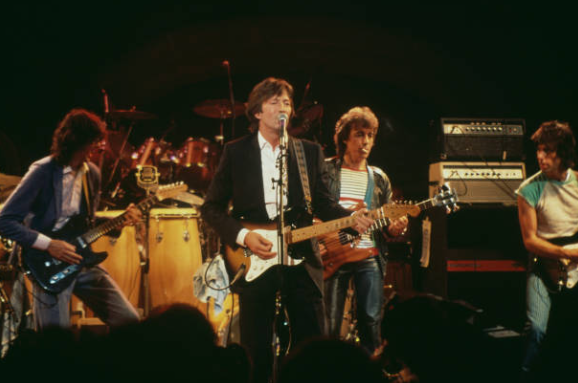Enlightenment's Melody: Decoding Eric Clapton's 'Pilgrim' Journey
(watch the video below)
Eric Clapton's "Pilgrim" stands as a testament to his enduring talent and his ability to evolve as an artist while maintaining a distinct sound that resonates with audiences across generations. Released as the title track of his 1998 album, "Pilgrim" represents a departure from Clapton's earlier blues-rock roots, delving into themes of spiritual journey, self-discovery, and redemption. In this comprehensive analysis, we will explore the musical, lyrical, and cultural dimensions of the song, dissecting its composition, its lyrical depth, and its significance within Clapton's body of work.
"Pilgrim" opens with an ethereal synthesizer melody that sets the tone for the rest of the song. The synthesizer is accompanied by a subtle drum loop and a pulsating bassline, creating a hypnotic rhythm that underpins the entire track. Clapton's iconic guitar playing takes center stage during the verses, with his trademark smooth tone and expressive phrasing weaving seamlessly with the instrumentation. The chorus introduces a more expansive arrangement, with layers of keyboards, guitars, and backing vocals building towards a climactic crescendo.

One of the most notable aspects of "Pilgrim" is its use of electronic elements, a departure from Clapton's traditional blues-rock sound. The song incorporates programmed drums, synthesizers, and other electronic effects, giving it a modern and contemporary edge. This fusion of electronic and organic elements reflects Clapton's willingness to experiment with new sounds and styles, demonstrating his versatility as a musician.
Thematically, "Pilgrim" explores the journey of self-discovery and spiritual awakening. The lyrics speak of a pilgrim on a quest for truth and enlightenment, traversing a metaphorical landscape fraught with obstacles and challenges. Throughout the song, there is a sense of searching and longing, as the protagonist grapples with existential questions and seeks meaning in a world filled with uncertainty.
The imagery in "Pilgrim" is rich and evocative, painting vivid pictures of desolate landscapes, winding roads, and distant horizons. The lyrics are imbued with a sense of introspection and introspection, as the protagonist reflects on their past mistakes and regrets while striving to find redemption and forgiveness.
At its core, "Pilgrim" is a song about transformation and rebirth. It speaks to the universal human experience of growth and change, of overcoming adversity and emerging stronger on the other side. In this sense, the song carries a message of hope and resilience, reminding listeners that no matter how difficult the journey may be, there is always the possibility of renewal and redemption.

Beyond its musical and lyrical merits, "Pilgrim" holds significant cultural importance within the context of Clapton's career. The song marked a stylistic departure for Clapton, signaling his willingness to embrace new sounds and experiment with different genres. Coming on the heels of his hugely successful "Unplugged" album and his induction into the Rock and Roll Hall of Fame, "Pilgrim" demonstrated Clapton's continued relevance and influence in the music world.
Moreover, "Pilgrim" resonated deeply with audiences around the world, becoming a fan favorite and earning critical acclaim from music critics. Its success helped solidify Clapton's status as a legendary figure in the pantheon of rock and blues music, further cementing his legacy as one of the greatest guitarists of all time.
In conclusion, Eric Clapton's "Pilgrim" is a masterful piece of music that showcases his unparalleled talent and artistic vision. From its haunting melodies to its introspective lyrics, the song captivates listeners with its depth and emotional resonance. As a testament to Clapton's enduring legacy, "Pilgrim" continues to inspire and enchant audiences, reaffirming its place as a timeless classic in the annals of rock and roll history.
Video
Lyrics
Let's sing along with the lyrics !
And how do I choose and where do I draw the line
Between truth and necessary pain?
And how do I know and where do I get my belief
That things will be all right again?
What words do I use to try and explain
To those who have witnessed all my tears?
And what does it mean to know all these things
When love's been wasted all these years
When love's been wasted all these years
standing in the shadows
With my heart right in my hand
(Removed from) removed from other people
Who could never understand
I was a pilgrim for your love
A pilgrim for your love
A pilgrim for your love
I was a pilgrim for your love
It's like living in a nightmare
Like looking in a blackest hole
Like standing on the edge of nothing
Completely out of control
Now where have I been all these years?
And how come I just couldn't see?
Like a blind man walking 'round in darkness
I was a pilgrim for your love
I was a pilgrim for your love
standing in the shadows
With my heart right in my hand
(Removed from) removed from other people
Who could never understand
(Standing) standing in the shadows
With my heart right in my hand
(Removed from) removed from other people
Who could never understand
I was a pilgrim for your love
A pilgrim for your love
I was a pilgrim for your love
A pilgrim for your love
I was a pilgrim for your love
A pilgrim for your love
I was a pilgrim
A pilgrim for your love
I was a pilgrim for your love
(Removed from)
(People)
I was a pilgrim
A pilgrim for your love
I was a pilgrim
A pilgrim for your love
(Removed from)
(People)
Who could never understand
I was a pilgrim
(I was a pilgrim for your love)
A pilgrim for your love
(For your love)
I was a pilgrim
(I was a pilgrim for your love)
I was a pilgrim for your love
I was a pilgrim
I was a pilgrim
(I was a pilgrim for your love)
I was a pilgrim
(I was a pilgrim for your love)



